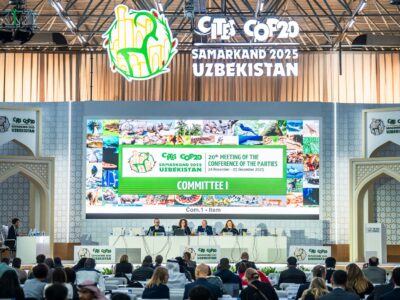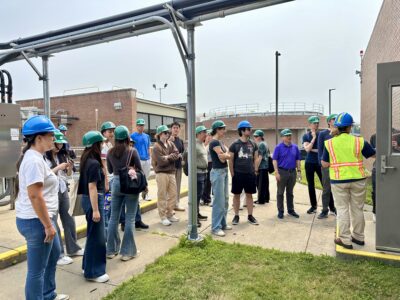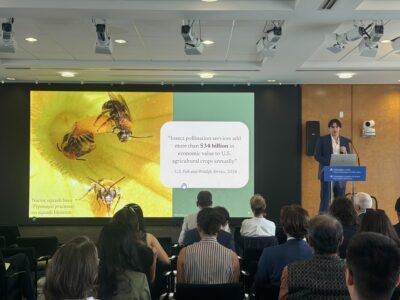
On April 30, students in the Master of Public Administration in Environmental Science and Policy presented their initial findings for the Workshop in Applied Earth Systems Policy Analysis to fellow students, staff and invited guests at Columbia’s School of International and Public Affairs. The spring workshop projects allowed ESP students to gain experience tackling tough environmental problems by working with real-world clients while creating the collaborative environment necessary for the students to understand the importance of teamwork when it comes to solving the challenging environmental and economic problems society faces, and will continue to face in the future.
“This semester, my team had a challenging task,” said Nancy Degnan, the faculty advisor to the “Sustainable Economic Development through Entrepreneurship Opportunities and Assets and Higher Education” workshop group. “The group needed to address how to advance and achieve sustainable environmental and economic development for eastern Kentucky. The main questions revolved around how the team could make a set of sound recommendations for communities whose livelihoods, for generations, have been based on coal mining and production. Our client, the Kentucky Community and Technical College System, or KCTCS, is deeply committed to using their resources to help transition the current economy of Appalachia to a more sustainable one. The ESP Workshop team’s research and recommendations in key sectors like sustainable agriculture and environmental remediation supported KCTCS in their efforts to provide education and training to the people of eastern Kentucky.”
Students in the ESP program conduct research and analysis in the workshop course for each of the three semesters they spend in the program. By shifting the focus of their research each semester, students are able to gain a variety of skills and experiences addressing such issues as management, funding and legislative initiatives. This semester’s workshop projects, intended to give students experience tackling tough environmental problems by working with real-world clients, dealt with topics ranging from natural disaster resilience to evaluating the success of solar incentive programs.
“The final briefings are always exciting. It’s fascinating to see what each group has been able to accomplish in just a semester, especially when the projects are so diverse,” said Katherine Edmond, the presenter for the “Analysis of New York City Department of Sanitation’s Residential Enrollment Programs” workshop team. “Our cohort’s projects included everything from a climate change resiliency tool kit for the Rockaways, to sustainable development curricula for colleges in Kentucky, to financing options for the MTA and Port Authority, to my team’s project analyzing interest and enrollment in the Department of Sanitation’s voluntary residential recycling programs. It was really impressive to see how each team rose to the unique challenges presented by their clients and how much we’ve all learned about project design and management over the course of the MPA-ESP program.”
The methodological purpose of the workshops is to create a collaborative environment for the students to understand how to work in groups. Group collaboration is stressed throughout the ESP program to emphasize that environmental problems are multi-faceted and need lawyers, scientists, economists, naturalists and nonprofit grassroots organizers to help solve the challenging environmental and economic problems that we as a society face, and will continue to face in the coming years.
Project: New Ways for Governing and Financing the MTA
Client: Regional Plan Association
Faculty advisor: Rohit Aggarwala
The Regional Plan Association is seeking assistance in developing financing and organizational models for the Metropolitan Transportation Authority (MTA) by researching different regimes at comparable public authorities (nationally and internationally) and analyzing their applicability for the MTA. The goal will be to identify ways in which the MTA can generate a significant revenue stream on its own so that its revenue sources are diversified and the agency is not solely dependent on government funding and borrowing.
Project: Building Resilience to Natural Disasters on the Rockaway Peninsula
Client: Friends of Rockaway
Faculty advisor: Kathy Callahan
The goal of this workshop project is to develop updated community maps that will show potential changes that the Rockaway Peninsula will undergo over the next several decades. We would work on a framework that could be used for engaging the community of Rockaway in planning for extreme weather situations which may become more frequent due to climate change. The maps would be a tool to assist in communication and discussion for the future.
The workshop group will collect and collate relevant data, conduct interviews with impacted residents, meet with experts on Hurricane Sandy and disaster resilience, and leverage the experience and connections that Friends of Rockaway has developed since Hurricane Sandy.
Friends of Rockaway is a non-profit organization developed, in conjunction with St. Bernard Project, to help residents in need rebuild their homes. We have a designated liaison, an ESP graduate, who will maintain communication with us through the project. Friends of Rockaway work with other non-profit organizations that have connections on the Rockaway peninsula and nationally. This workshop may be able to contribute templates on how to assist communities in planning and restoration decisions.
Project: Promoting Energy Efficiency in New York State Government Buildings
Client: State of New York “Build Smart NY”
Faculty advisor: Steven Cohen
Build Smart NY is the State of New York’s strategic initiative aimed at aggressively pursuing energy efficiency in New York State government buildings while advancing economic growth, environmental protection and energy security in New York State. The centerpiece of Build Smart NY is Executive Order 88, which was issued by Gov. Cuomo on Dec. 28, 2012. The order mandates a 20 percent improvement in the energy efficiency performance of state government buildings by April 2020.
The order designates the New York Power Authority to coordinate compliance and drive the state to the 20 percent target. NYPA, the largest state public power organization in the nation, has a long history of supporting the advancement of energy efficiency in governmental facilities. NYPA, established in 1931, provides some of the cheapest electricity in North America to a diverse customer base including large and small businesses, non-for-profit entities and government entities. They are dedicated to providing clean, low-cost and reliable energy while promoting economic and job development in the state. Since its inception and throughout its more than 80 years of history, NYPA has employed sustainable practices in its development of clean, renewable hydropower and advancement of energy efficiency technologies.
The workshop group will investigate programs to improve energy efficiency in jurisdictions throughout the U.S. and Canada. The focus will be to identify innovative and cost-effective building operation and maintenance practices that could be used to improve the energy efficiency of New York State government buildings.
Project: Sustainable Economic Development through Entrepreneurship Opportunities and Assets and Higher Education
Client: Kentucky Community and Technical College System, Big Sandy Community and Technical College President George Edwards; Billie Hardin, the college system’s sustainability project manager
Faculty advisor: Nancy Degnan
On Nov. 19, 2013, the National Association for Community College Entrepreneurship and ARC announced a partnership to promote entrepreneurship through community colleges in order to identify sustainable economic development opportunities for Kentucky’s Appalachian region. The partnership targets six community colleges in the region that are part of the Kentucky Community and Technical College System. The system comprises 16 colleges and more than 70 locations statewide and endeavors to lead the Appalachian region in its goal to transform its economy and resiliency through sustainable community and economic development. The system requests that the workshop team produce a report driven by three overarching questions. How can the system 1) help define and provide an infrastructure for sustainable education, research, development and access to capital for small businesses in their communities; 2) encourage communities and economies to embrace an entrepreneurial culture; and 3) identify small business support models based on community fit? The final product should include findings that can be used to obtain funding for implementation and replication across the college system. The system welcomes recommendations and model approaches that help: i.) build infrastructure, community assets and resiliency; ii.) advance professional development modules for faculty and staff for the benefit of sustainable economic development; and/or, iii.) suggest/identify specialized training for business, industry and community stakeholders.
Project: Analysis of New York City Department of Sanitation’s Residential Enrollment Programs
Client: Department of Sanitation’s Bureau of Waste Prevention, Reuse, and Recycling
Faculty advisor: Louise Rosen
Every year, New York City creates more than 14 million tons of waste. According to the 2004-2005 Waste Characterization Study, New Yorkers are only separating half of the traditional materials (paper, metal, glass and plastic) that could potentially be recycled. In addition, textiles make up 8 percent of our residential and institutional waste stream; electronics make up the largest and fastest growing component of hazardous materials entering our waste stream; and organics suitable for source-separated composting make up almost 30 percent of the waste stream. PlaNYC established a goal of 75 percent diversion by 2013. New initiatives have been developed to help make this possible.
The Bureau of Waste Prevention, Reuse and Recycling currently operates four free and voluntary programs for residential buildings in New York City:
- Apartment Building Recycling Initiative: improves residential recycling operations through on-site assessments and trainings, since 2007.
- re-fashioNYC: provides donation bins for convenient reuse and recycling of unwanted clothing and linens, since 2011.
- e-cycleNYC: provides pickup and responsible recycling of unwanted electronics in residential buildings, since 2013.
- organics collection for multi-unit buildings: provides collection of organic waste, including food scraps, soiled paper and yard waste to select buildings and neighborhoods, still in pilot phases.
This project should develop reasonable and researched recommendations for an expansion plan for these programs in the next year.
Project: Evaluating the effectiveness of New York’s solar incentive programs in reaching an economically diverse residential customer base
Client: GRID Alternatives
Faculty advisor: Sara Tjossem
This workshop project focuses on evaluating the effectiveness and success of New York State’s flagship solar policy, the NY-Sun Initiative, in creating widespread solar adoption in New York’s residential sector. The NY-Sun Initiative is largely based on California’s existing solar programs, and a significant portion is a rebate program, funded by ratepayers, that provides up-front rebates to help spark solar adoption in the residential marketplace.
The workshop’s overarching project theme would be analyzing the initiatives’ effectiveness and success in reaching different socio-economic classes of customers. Students would develop a project to address the following: Is the program serving wealthy “first- adopters”? Or are middle- and lower-income customers accessing the technology? Where have most of the installations been sited (by zip code?) Is there a link between the marketing approach of the program and where projects are installed? If there are fewer projects in lower-income areas, what policy changes or programs might help increase solar adoption in these areas? The workshop team could potentially assess other benefits/successes of the NY-Sun Initiative, such as green jobs created by the initiative: What metrics are being collected? Where are the jobs, types of jobs? How are community job training programs involved? Are jobs being created for residents of underserved communities?
Students in the MPA in Environmental Science and Policy program enroll in a year-long, 54-credit program offered at Columbia University’s School of International and Public Affairs, in partnership with the Earth Institute. Throughout this one-year program, students are immersed in courses that combine Columbia University’s hands-on approach to teaching public policy and administration with pioneering thinking about the environment. During the summer semester, students learn the fundamentals of environmental science, while in the fall and spring semesters, they focus on the policy and economics necessary to becoming successful environmental analysts and managers. Visit our website to learn more about the program.



